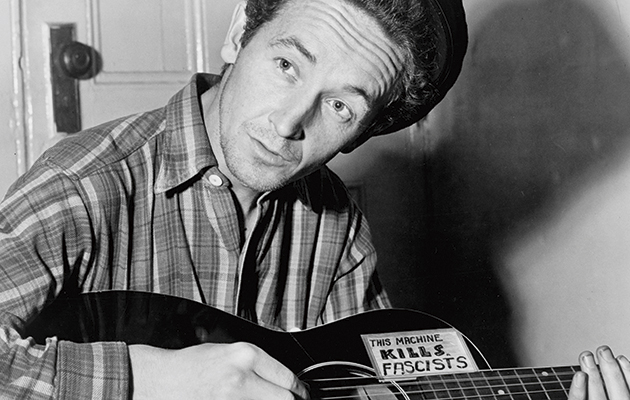In 1950 Woody Guthrie moved his family into a new apartment building in Brooklyn called Beach Haven. They lived there only two years, but the short chapter has taken on new relevance in recent years. Beach Haven was, by decree of the US government and by practice of its owner, a whites-only block, one that profited from what the Federal Housing Authority suspiciously labelled “inharmonious uses of housing”. Woody was disgusted to discover this practice, eventually breaking the lease and moving out of Beach Haven. He of course wrote about the experience, in prose and in song, naming the owner in unrecorded lyrics titled “Old Man Trump” and “Trump Made A Tramp Out Of Me”.
Uncovered and published in early 2016 by Will Kaufman, a Guthrie scholar at the University Of Central Lancashire, those lyrics became suddenly relevant nearly 70 years after they were written, when Fred Trump’s son was elected President. As Woody writes in “Old Man Trump”, “I suppose that Old Man Trump knows just how much racial hate he stirred up in that bloodpot of human hearts.”
“The lyrics are great and the timeliness of them is just so weird,” says Deana McCloud, executive director of the Woody Guthrie Center, where the original handwritten lyrics are on display. “There’s also a typed document that Woody wrote about Beach Haven, where he talks about the difference races and cultures that are being separated. But he puts out a solution: Let’s you and me get together and talk and sing together and walk together until we sink this goddam race hate together? He wanted to find common ground and solve problems like this together.”
Shortly after the lyrics were published, Nora Guthrie worked with a Baltimore singer-songwriter-activist named Ryan Harvey to set them to music, melding fragments of several unfinished songs into one brand-new Woody Guthrie tune and recruiting Ani DiFranco and Tom Morello (with whom Harvey co-owns Firebrand Records). Says Harvey, “We decided that instead of doing something really folky, we wanted to do something a little different, something a bit more folk-punk. Let’s update it. It doesn’t have to sound like Woody Guthrie. Ani kept telling me, ‘Go harder. Sing harder. Get angry with it.’”
The trio managed to update the material to the present day, with a punk energy and a snarling urgency. “I didn’t know Ryan before,” says DiFranco, “but we were both like, we have to record this song right now. It shows you how the news recycles itself. I’ve been writing songs for 30 years, and it’s a really sickening feeling to pull out a song from so long ago that sounds like it was written yesterday. I thought, ‘Wow, history does nothing but repeat itself.’”
The lyrics have a time-capsule effect, as though Woody was documenting his present to predict the future. Says Harvey, “If you take that story and you look at Woody Guthrie as representing left-wing populism and if you look at Fred Trump as representing right-wing private interests, the song becomes a snapshot of the entire history of the country. You listen to Woody Guthrie and some of those songs could have been written right now.”
While “Old Man Trump” has remained relevant well into 2017, Harvey has no illusions that his or Guthrie’s music will soundtrack the movements reshaping America in the 2010s. “I’m a white male folk singer. We’re not going to be the people writing the big songs affecting these larger movements. There are new forms of music and other voices that are carrying a lot further and are a lot more relevant at this moment. Bob Dylan isn’t going to be writing the theme song for something like Black Lives Matter, but a hip-hop artist or a soul artist or even a rock artist might.”
That seems to be the consensus at the moment: folk is no longer the music of the folks, but a more rarified form that doesn’t reach as many people as it once did. Harvey and DiFranco suggest hip-hop might be a more relevant force, with Kendrick Lamar in particular carrying on Woody’s legacy on a much more popular, populist level.
Segarra points to a video of demonstrators in Ferguson, Missouri, protesting another shooting of an unarmed African American by police and chanting the chorus of Lamar’s “Alright”. “I just love that video so much. It’s so beautiful it makes me cry. Kendrick is one of the greatest artists of our generation. I think about that new song ‘DNA’. When I hear it, it reinforces this idea that Puerto Ricans and African Americans and indigenous people all come from a beautiful place, that we’re all Americans just like anyone else. Something else that I get from Woody’s music is being recharged and re-energised by just a love of the people – people who are working hard, who are suffering, who are just trying to make a better life for their families. That’s what I’ve been trying to tell myself. Even if the fight continues forever, it’s always worth it to try to change the world. Even if you don’t succeed, it was fucking worth it.”



